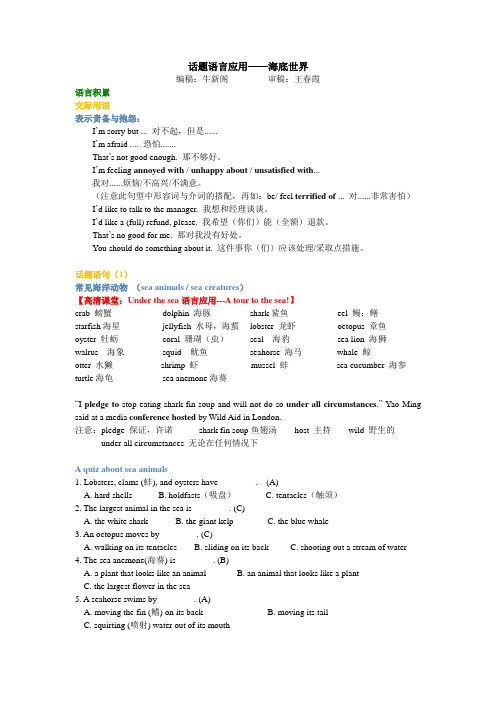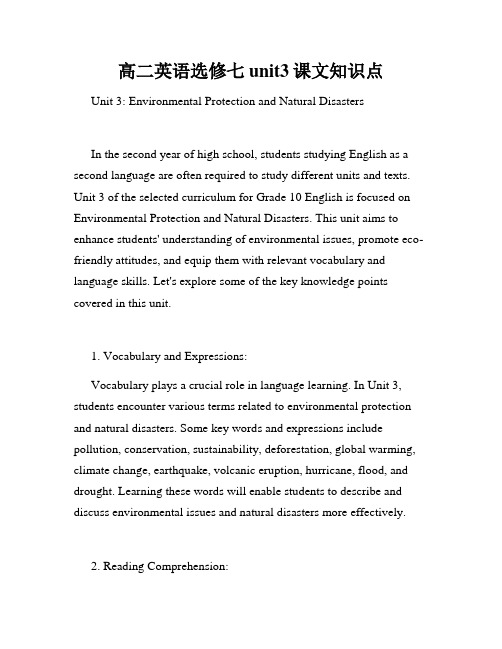人教版高中英语选修7Unit3知识点详解教学内容
【人教版选修七】unit 3 词汇学习

教学过程一、复习预习教师引导学生复习上节课所学的知识,(以提问、回顾的形式进行),针对上节课的作业进行讲评、订正、答疑,并通过对疑问代词具体用法的分析和扩展导入本节课所要学习的内容二、知识讲解知识点1:annualannual adj. 每年的;按年度计算的/ n. 年刊;年鉴[重点用法]annually adv. 年年地, 每年地[典例]1) an annual income. 年收入2) an annual report年度报告3) Premier Wen Jiabao noted that the two most important problems would be previous to anything else in the government annual report.温家宝总理在政府年度报告中指出要优先解决这两大问题。
[练习] 汉译英1) 为加深理解,我们愿意与国外友人交换学校年鉴。
2) 工人们的年收入增加了250元。
Keys: 1) To have a better understanding, we would like to exchange the school annual with the foreign friends.2) The wage of workers makes an annual increase of 250 yuan this year.个性化教案知识点2:witnesswitness n. 目击者;证人;证据vt. 当场见到;目击[典例]1) He is the witness to the accident.事故的目击者2) This old auditorium has witnessed many ceremonies.这个古老的礼堂内举行过许多次典礼[重点用法]give witness on behalf of sb. 为某人作证[练习] 汉译英1) 没有人能证明他在场。
选修7Unit3语法讲解课件

倒装句的定义
倒装句
英语中,有时为了强调、突出某个部分,或者使句子结构平 衡,将谓语动词、助动词、情态动词等置于主语之前,这种 语序称为倒装。
倒装句分为两种
全部倒装(Full Inversion)和部分倒装(Partial Inversion )。
倒装句的分类
全部倒装
整个谓语置于主语之前。
部分倒装
虚拟语气的用法
在条件状语从句中,使用虚拟语气来表示与事实相反的情况…
“If I were you, I would take the job.”(如果我是你,我会接受这份工作。)
在目的状语从句中,使用虚拟语气来表示为了达到某种目的…
“I spoke loudly so that he might hear me.”(我大声说话以便他能听到我。)
02
它通常用于与事实相反的情况, 或者表达主观愿望、强烈的情感 或态度。
虚拟语气的分类
条件虚拟语气
情感虚拟语气
表示假设条件下的虚拟情况,通常与 “if”引导的条件句一起使用。
表示对某事物的强烈情感或态度,通 常与“wish”、“as if/though”等 词或短语一起使用。
目的虚拟语气
表示为了达到某种目的而进行的虚拟 行为,通常与“so that”或“in order that”引导的目的状语从句一用法
不定式可以作为主语、宾 语、定语、状语等成分使 用,表示未来的动作或行 为。
现在分词的用法
现在分词可以作为主语、 宾语、定语、状语等成分 使用,表示正在进行的动 作或行为。
过去分词的用法
过去分词可以作为定语、 状语等成分使用,表示已 经完成的动作或行为。
05
语法点四:倒装句
选修7 Unit3 Using课文加知识点讲解

对自己学习情况的反思和评价
掌握情况:回顾所学知识,评 估自己是否理解并能够运用
不足之处:找出自己在ຫໍສະໝຸດ 习中 的薄弱环节,分析原因改进方法:针对不足之处,制 定有效的学习计划和方法
自我评价:对自己的学习态度、 方法和成果进行评价,激励自 己不断进步
对未来学习的规划和展望
确定学习目标:根据个人兴趣和职业规划,制定长期和短期学习目标 制定学习计划:合理安排时间,分配学习任务,确保按计划进行 持续学习:保持学习的热情和动力,不断探索新的知识和技能 实践应用:将所学知识应用到实际生活中,提高解决问题的能力
关系
课文的时代意 义:分析课文 所反映的时代 特点和社会问 题,以及它对 当时读者的影
响
课文的情节概 述:简要介绍 课文的主要情 节和故事发展, 帮助读者更好 地理解课文内
容
课文的主题和目的
主题:介绍课文的主要内容 和中心思想
目的:通过讲解课文背景, 帮助学生更好地理解课文内 容,提高阅读理解能力
短语解释:对课文 中的常用短语进行 解释和说明,提高 语言表达能力。
词汇和短语的用法 :通过例句展示词 汇和短语的用法, 加深理解和记忆。
近义词和反义词: 提供词汇和短语的 近义词和反义词, 扩大词汇量,提高 语言运用能力。
难句解析和翻译
难句解析:挑选出课文中的难点句子,进行详细解释和翻译 翻译技巧:介绍常见的翻译技巧,如直译、意译等,并举例说明 语境理解:强调在翻译过程中对语境的理解和把握,以提高翻译的准确性 练习与巩固:提供相关练习,让学生通过实际操作加深对难句解析和翻译的理解
Using课文加知识 点讲解
汇报人:
目录
01 单击此处添加目录标题内容 03 课文内容解析 05 课文应用实例
Unit3Underthesea知识点 高中英语人教新课标选修七

Words & Expressions
PART 1
词形转换
1.___fl_e_e____ vi.逃避;逃跑→__fl_e_d_/f_l_ed_________过去式,过去分词 2. __d_r_a_g____ vt. 拖;拉;扯→_d_r_a_g_g_e_d_/_d_r_a_g_g_in_g_过去式,现在分词 3.___d_e_ep____ adj.深的→___d_e_p_th___ n.深,深处→___d_e_ep__en__ v.加深, 变深
[能力提升] ① 学生形成珍视父母的爱的意识很重要。
It is important that students develop/form an awareneww of valuing parents’ love. ②我的老师试图提高学生的环保意识。 My teacher tried to raise students’ awareness of environmental protection.
PART 2
四个比较
annyally =yearly
drag=
draw pull
conservation=
preservation protection
conversation
awesome 令人 敬畏的;令人畏
惧的
awful 糟糕的; 可怕的
四个一词多义
urge 一词多义
narrow 一词多义
3. He urged that we (should) take such steps.
4. The situation is dangerous and the UN is
urging caution. 极力主张
新版人教版选修7 第3单元 单词讲解(共34张PPT)演示课件

做个X射线检查,然后他就可以做出诊断。urge sb. to do sth.“催促/力劝某人做某事”。
【答案】 A
abandon vt.遗弃;抛弃(某人);中止 n.放任;放纵
We will never abandon our principles.我们应该坚持原则。 (1)abandon oneself to(doing)纵情于,沉溺于…… She abandoned herself to despair.她陷入绝望之中 . Please abandon youself to studying.请让你自己沉溺于学习。 (2)abandon doing sth.放弃做某事 (3)with abandon放纵地,放任地 People were shouting and cheering with abandon. 人们纵情欢呼。 (4) abandoned adj. 放荡的,放纵的,无拘束的
They scared the little boy into stealing foods in the supermarket.
他们威胁这个小男孩到超市里去偷食品。
scare sb.to death把某人吓得要死be scared to death
(2)scared adj. 害怕的;担心的;恐惧的
6.flee vi.& vt.逃走;逃离;逃避 归纳拓展 注意:flee 作“逃跑”讲时,可以是及物动词,也可以是不 及物动词。用作及物动词时,它的过去式和过去分词都是 fled。 flee from 从……逃离,逃避 flee to 逃至 When they saw the police car,his attackers turned and fled. 那些袭击他的人看到警车后转身就逃。
人教版高中英语选修七Unit3Underthesea知识讲解话题语言应用——海底世界

话题语言应用——海底世界编稿:牛新阁审稿:王春霞语言积累交际用语表示责备与抱怨:I’m sorry but ... 对不起,但是......I’m afraid .... 恐怕.......That’s not good enough. 那不够好。
I’m feeling annoyed with / unhappy about / unsatisfied with...我对......烦恼/不高兴/不满意。
(注意此句型中形容词与介词的搭配,再如:be/ feel terrified of ... 对......非常害怕)I’d like to talk to the manager. 我想和经理谈谈。
I’d like a (full) refund, please. 我希望(你们)能(全额)退款。
That’s no good for me. 那对我没有好处。
You should do something about it. 这件事你(们)应该处理/采取点措施。
话题语句(1)常见海洋动物(sea animals / sea creatures)【高清课堂:Under the sea语言应用---A tour to the sea!】crab 螃蟹 dolphin 海豚shark鲨鱼e el 鳗;鳝starfish海星jellyfish 水母,海蜇 lobster 龙虾 octopus 章鱼oyster 牡蛎coral 珊瑚(虫)seal 海豹sea lion 海狮walrus 海象 squid 鱿鱼seahorse 海马whale 鲸otter 水獭shrimp 虾mussel 蚌sea cucumber 海参turtle海龟sea anemone海葵“I pledge to stop eating shark fin soup and will not do so under all circumstances.” Yao Ming said at a media conference hosted by Wild Aid in London.注意:pledge 保证,许诺shark fin soup鱼翅汤host 主持wild 野生的under all circumstances 无论在任何情况下A quiz about sea animals1. Lobsters, clams (蚌), and oysters have ________. (A)A. hard shellsB. holdfasts(吸盘)C. tentacles(触须)2. The largest animal in the sea is ________. (C)A. the white sharkB. the giant kelpC. the blue whale3. An octopus moves by ________. (C)A. walking on its tentaclesB. sliding on its backC. shooting out a stream of water4. The sea anemone(海葵) is ________. (B)A. a plant that looks like an animalB. an animal that looks like a plantC. the largest flower in the sea5. A seahorse swims by ________. (A)A. moving the fin (鳍) on its backB. moving its tailC. squirting (喷射) water out of its mouth6. Which one is a mammal that lives in the sea? (C)A. a starfishB. an octopusC. a whaleHow much do you know about sea animals? T or F1. Different types of fish live in different parts of the ocean. (T)Some live close to coral reefs. Some live near the surface. Some even live in the deep water close to the bottom of the ocean.2. Sharks are one of the better known predators (食肉动物) in the sea but they don’t have teeth.(F)Many sharks have sharp teeth that are used to catch their food.3. Fish usually travel in schools because they like to be together. (F)The movement of all the fishes may confuse a predator. Plus, there are more eyes to look out for danger.4. Coral reefs are created by dead creatures called polyps (珊瑚虫). (F)Polyps are tiny creatures that form a hard skeleton to protect their bodies.5. Seals spend all of their time in water. (F)They must return to the surface to breathe, just like other mammals.6. A seal can go for 40 minutes without a breath. This allows them to dive to a depth of over 2,000 feet. (T)7. Mother penguins keep the egg on her feet for 60 days without eating anything. (F)Father does the job.8. Jellyfish are creatures that have no bones and they are hidden on the seabed. (F)They are creatures that just float in the ocean.Sea transportation? (海上运输)canoe 独木舟 sailboats 帆船ferry渡轮submarine 潜水艇banana boats kayak 皮划艇jet ski 水上摩托fishing boats 渔船tanker 油船ocean liner 远洋定期客轮■话题语句(2)1. 有关海洋的词汇sea 海ocean 大洋bay 海湾,湾gulf 海湾、鸿沟cape 海角headland 海角,岬cliff 悬崖峭壁strait 海峡reef 礁石sandbar 沙洲tide 潮wave 浪iceberg 冰山delta 三角洲mouth 河口seaquake 海震,海啸low water 最低水位territorial waters 领海,领水current, watercourse 水流rapids 急流port, harbour 港(美语harbor)the Antarctic 南极洲offshore 近海的; 海面上的注:shore,seaside,beach,coast,bank的不同1)shore 指海岸,湖岸,也指近海的一带。
高二英语选修七unit3课文知识点

高二英语选修七unit3课文知识点Unit 3: Environmental Protection and Natural DisastersIn the second year of high school, students studying English as a second language are often required to study different units and texts. Unit 3 of the selected curriculum for Grade 10 English is focused on Environmental Protection and Natural Disasters. This unit aims to enhance students' understanding of environmental issues, promote eco-friendly attitudes, and equip them with relevant vocabulary and language skills. Let's explore some of the key knowledge points covered in this unit.1. Vocabulary and Expressions:Vocabulary plays a crucial role in language learning. In Unit 3, students encounter various terms related to environmental protection and natural disasters. Some key words and expressions include pollution, conservation, sustainability, deforestation, global warming, climate change, earthquake, volcanic eruption, hurricane, flood, and drought. Learning these words will enable students to describe and discuss environmental issues and natural disasters more effectively.2. Reading Comprehension:Unit 3 presents a series of reading passages to improve students' reading comprehension skills. The texts cover topics such as climate change, the impact of pollution on our ecosystem, and the aftermath of natural disasters. By reading these articles, students develop their ability to identify main ideas, understand supporting details, and make inferences. They also gain awareness of the importance of environmental protection in our daily lives.3. Listening and Speaking:Listening and speaking activities provided in this unit help improve students' oral communication skills. They are encouraged to listen to conversations, interviews, and speeches related to environmental issues. By engaging in discussions and debates, students develop their ability to express opinions, present arguments, and support claims with evidence. These activities promote critical thinking, active participation, and effective communication in English.4. Grammar and Language Functions:Unit 3 focuses on specific grammar structures and language functions related to the topic. Students are introduced to various sentence patterns, such as expressing opinions using modal verbs (e.g., "should," "must"), making conditional statements (e.g., "if...then"), and using reported speech to convey others' opinions. These grammarpoints enable students to communicate their thoughts and ideas accurately and appropriately.5. Writing Skills:The unit includes writing tasks that require students to compose essays, reports, or letters related to environmental protection and natural disasters. These writing activities aim to develop students' skills in organizing ideas, structuring paragraphs, and using appropriate vocabulary and grammar. By practicing different writing styles, students enhance their ability to express themselves effectively in written form.Overall, Unit 3 of the Grade 10 English curriculum provides students with a comprehensive understanding of environmental issues and natural disasters. Through vocabulary acquisition, reading comprehension, listening and speaking exercises, grammar practice, and writing tasks, students develop their language proficiency, critical thinking abilities, and awareness of the importance of environmental conservation. This unit equips students with the necessary skills to communicate confidently and effectively in English while discussing these crucial topics.。
高中英语选修七unit3重点词汇 短语讲解教案 及练习含解析

教学过程一、复习预习教师引导学生复习上节内容,并引入本节课程内容二、知识讲解考点/易错点1 重点单词1. witness① vt.目击,作证,证明1. We all came to witness history and watch the historic flight of teacher Christa McAuliffe.我们聚集一起见证历史,观看教师克里斯塔•麦考利夫历史性的飞行。
2. Did anyone witness the robbery有人亲眼看到那次抢劫了吗witness an accident, a murder, a quarrel 目击一事故、谋杀事件、一场争吵②vi. 作证人He witnessed to having seen the man enter the building.③n. 证人,目击者,证据,证明,证词Life without a friend is death without a witness 在世无朋友,死后无证人。
The witness stated the facts very clearly. 证人把事实陈述得很清楚。
give witness on behalf of sb 替…作证be a witness to …. 是…的目击者witness to sth doing sth (在法庭上)作证bear / give witness to sth 作证支持某人2. accommodationn. 膳宿,旅馆房间;容纳,提供,适应Accommodation is expensive in this city.这个城市住房昂贵。
I will do my utmost to help you find accommodation.我将尽我最大之力帮你找到住处。
Can I raise a point about accommodation我可以提出一个关于膳宿供应的看法吗To look for accommodation 寻找住处Provide food and accommodation for sb 向某人提供食宿3. abandonabandon vt. 抛弃,离弃,遗弃;放弃In his early days he abandoned medicine for literature.他早年弃医学文。
- 1、下载文档前请自行甄别文档内容的完整性,平台不提供额外的编辑、内容补充、找答案等附加服务。
- 2、"仅部分预览"的文档,不可在线预览部分如存在完整性等问题,可反馈申请退款(可完整预览的文档不适用该条件!)。
- 3、如文档侵犯您的权益,请联系客服反馈,我们会尽快为您处理(人工客服工作时间:9:00-18:30)。
Part 1. Warming upPart 2. Pre-reading, reading and comprehending1.I thought ,at the time,that this was just a story but then I witnessed it with my own eyes many time.我当时认为这只是个故事,但是后来我却多次亲眼目睹了这样的事情。
witness vt. 目睹;目击;为⋯⋯作证句型witness to (doing/having done) sth. 证明某事;证实做了某事Police are appealing to any driver who may have witnessed the accident. 警方正呼吁曾目睹这事故的司机出面作证。
The 1980s witnessed increasing unemployment throughout Europe.20 世纪80 年代是全欧洲失业日益加剧的年代。
Her principal was called to witness to her good character. 她的校长被传唤来证明她优良的品质。
The driver witnessed to having seen the man enter the building. 司机作证说,他看到此人进入那栋建筑物。
n. 证据;目击者He has been a witness to a terrible murder. 他目击了一起残忍的凶杀事件。
His good health is a witness to the success of the treatment. 他身体健康证明这种疗法是成功的。
2.One afternoon I arrived at the station, as I was sorting out my accommodation, I heard a loud noise coming from the bay.归纳总结accommodation n. 住处;停留处;和解,调解;(pl.)住宿,膳宿(1)make accommodations for... 为⋯⋯提供膳宿book accommodation at a hotel 向旅馆预订房间arrange sb.' s accommodation 给某人安排住处(2)accommodate vt. 向⋯⋯提供住宿(或膳宿);容纳;为⋯⋯提供空间;考虑到;顾及;帮忙;给⋯⋯提供方便;顺应,适应(新情况)accommodate...to=adapt...to 使⋯⋯适应accommodate oneself to=adapt (oneself) to 适应;顺应accommodate sb.with sth.=supply sb.with sth. 给某人提供⋯⋯即学即用(1)客座艺术家们只好自掏腰包支付食宿费用。
Guest artists have to pay for their own accommodations and meals.( 2)旅馆房间不足。
The hotel accommodation is scarce.( 3)这幢房子可容纳两家人居住。
The house can accommodate two families(4) 银行将提供一笔贷款给你。
The bank will accommodate you with a loan.(5) 你必须使自己适应形势。
You will have to accommodate yourself to the situation.3.We ran down to the shore in time to see an enormous animal opposite us throwing itself out of the water and then crashing down again.搭配opposite to 在⋯⋯⋯的对面;与⋯⋯相反I sat opposite to him during the meal. 吃饭的时候我坐在他的对面。
The result was opposite to what we expected. 结果与我们所预料的正好相反。
see...doing... 看见⋯⋯正在做⋯⋯;throwing itself out of the water and then crashing down again 在句中作宾语补足语,与宾语an enormous animal 存在逻辑上的主谓关系,所以用现在分词形式。
I saw the little child crossing the street. 我看见那个小孩儿在过马路。
(1)在感官动词see, hear, look at, notice, observe, feel, find 等及使役动词have, make, leave, keep, get等后既可以用不定式也可以用动词-ing形式作宾语补足语。
不定式(不带to)表示过程或动词完成, v.-ing 形式强调进行或当时情景。
(2)另外在感官动词 see, hear, feel 等及使役动词 make, get, have, keep 等后也可用动词 -ed 形式 作宾语补足语,宾语与宾补之间存在逻辑上的动宾关系。
The boss kept the workers working the whole night. 那个老板让工人整夜地工作。
I have never heard him spoken ill of. 我从未听说过有人说他的坏话。
I have my hair cut once a month. 我每月理一次发。
4. “Come on, Clancy. To the boat George ” sa, id as he ran ahead of me.come on (祈使句,表示劝说,激励,不耐烦,催促)来吧,赶快,得了吧与 come 相关的短语:发生 偶然遇见 出版 经历...仍活着 ,安然渡过 总计 被提出;长出地面 提出come about , come through, come out , come up, come to , come across1) _____________ The cost of the journey 3000 yuan. 2) ______________ How did the accident ?3) When will the book _____________ ?4) I _________________ my teacher in the street yesterday .5) The seeds haven ' t ___________________ yet .6) The old man ______________ the World War I.comes to come about come out came across come up came through5. This was the call that announced there was about to be a whale hunt. 这是宣告捕鲸行动马上就 要开始的号角。
be about to do 表示打算或即将发生的动作,但它不与表示将来时间的副词或其他具体 将来时间状语连用。
但可以与 when 连用,构成固定句型。
6. Within a moment or two, its body was dragged swiftly by the killers down into the depths of thesea.drag vt. 拖;拉 vi. 拖曳;吸drag away 用力拖,拉drag out/on ( 使)持续过久,拖延drag sb. down 使身体垮掉;使情绪低落Her dress dragged on the floor. 她的裙子在地板上拖曳着。
Angry protesters were dragged away by the police. 愤怒的抗议者被警察拖走了。
They dragged out the meeting with long speeches. 他们的发言长篇大论,使会议拖了很长时间。
7. “In the meantime,Old Tom,and the others are having a good feed on its lips and tongue, ” ...在 这段时间里,老汤姆和其他虎鲸会饱餐一顿的,鲸唇和鲸舌就是它们的美食⋯⋯in the meantime 意为“在⋯⋯期间,同时”,其同义词是 meanwhile 。
for the meantime 目前,眼下8. “ Man overboard! Turn the boat around! ” urged George, shouting loudly. 归纳总结urge vt. 催促;极力主张;驱策。
come aboutcome acrosscome outcome throughcome to come up come upwith(1) urge sth./sb.on 催促某物 / 某人前进 urge sb.to do sth.催促某人做某事 urge sb.intodoing sth. 催促某人做某事(2) urge that...极力主张,强调,从句谓语形式为 (should)+ 动词原形It is urged that... 坚决要求⋯⋯,从句谓语形式为( should ) +动词原形 即学即用He argued all the students to take part in this activity.I urgued that he (should) do his best. It was urgued that he should be punished . 9. The sea was rough that day and it was difficult to handle the boat. 那天海面上风大浪高,很难 操纵船只。
be+adj.+to do 在“主语 + 系动词 +形容词 + 不定式”结构中,不定式与主语在意义上是动 宾关系, 但要用主动形式表被动意义; 如果不定式的动词是不及物的, 要在不定式后边加介 词。
